NMNF5103 Reflection in Nursing: Improving Skills and Practice
VerifiedAdded on 2023/06/15
|24
|7557
|173
Essay
AI Summary
This essay provides a comprehensive overview of reflective practice in nursing, highlighting its benefits for professional development and patient care. It discusses the two types of reflection: in-action and on-action, and the essential skills required for effective reflective practice, such as self-awareness, description, critical analysis, synthesis, and evaluation. The essay also explores the different purposes of reflection, including empowering individuals, developing ideas from observations, and bridging the gap between theory and practice. Barriers to reflective practice are identified, and two frameworks for reflection, Gibbs' model and John's model, are explained in detail. The essay emphasizes the importance of reflection in enhancing clinical knowledge, improving decision-making, and promoting a more holistic and individualized approach to nursing care. Desklib offers a wide range of resources, including past papers and solved assignments, to support students in their academic endeavors.
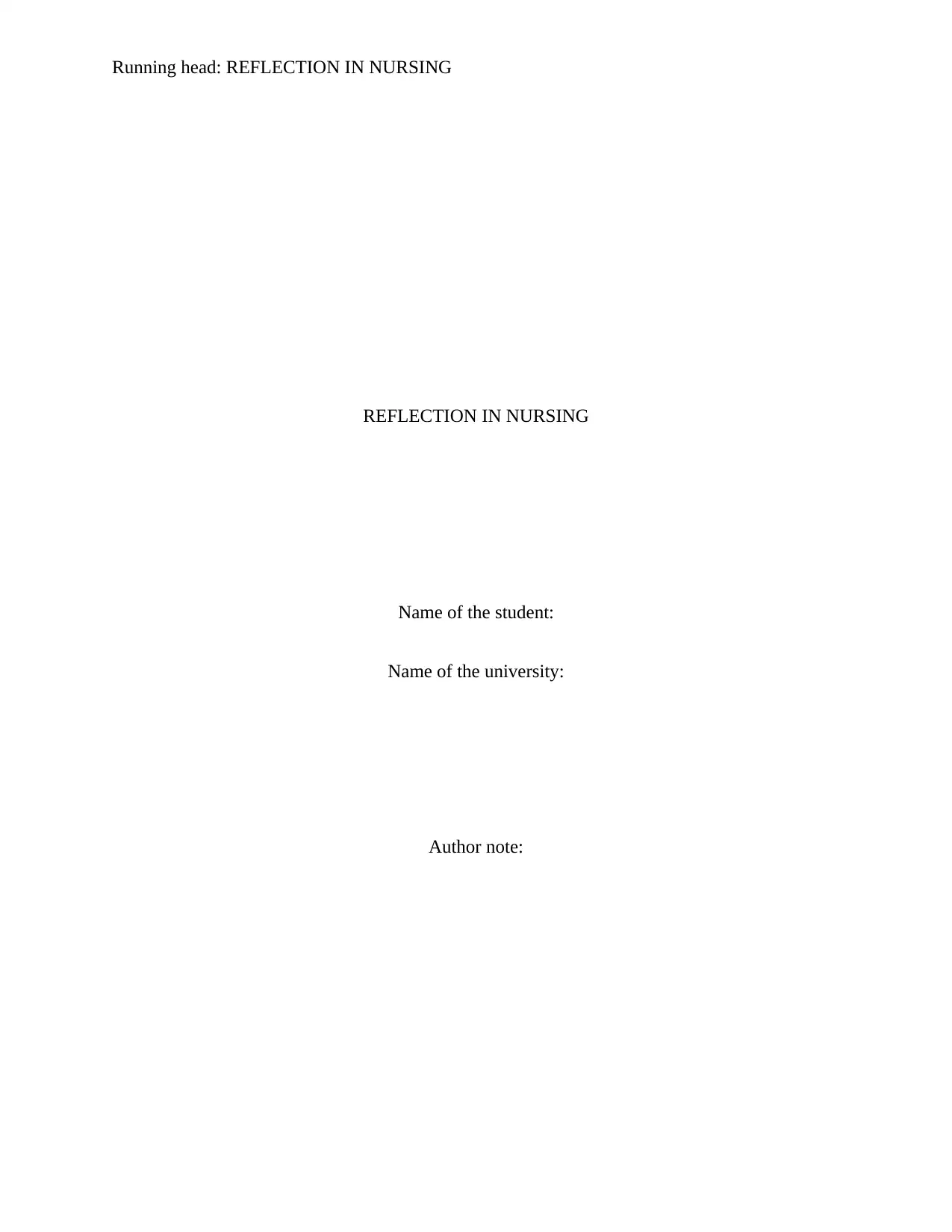
Running head: REFLECTION IN NURSING
REFLECTION IN NURSING
Name of the student:
Name of the university:
Author note:
REFLECTION IN NURSING
Name of the student:
Name of the university:
Author note:
Paraphrase This Document
Need a fresh take? Get an instant paraphrase of this document with our AI Paraphraser
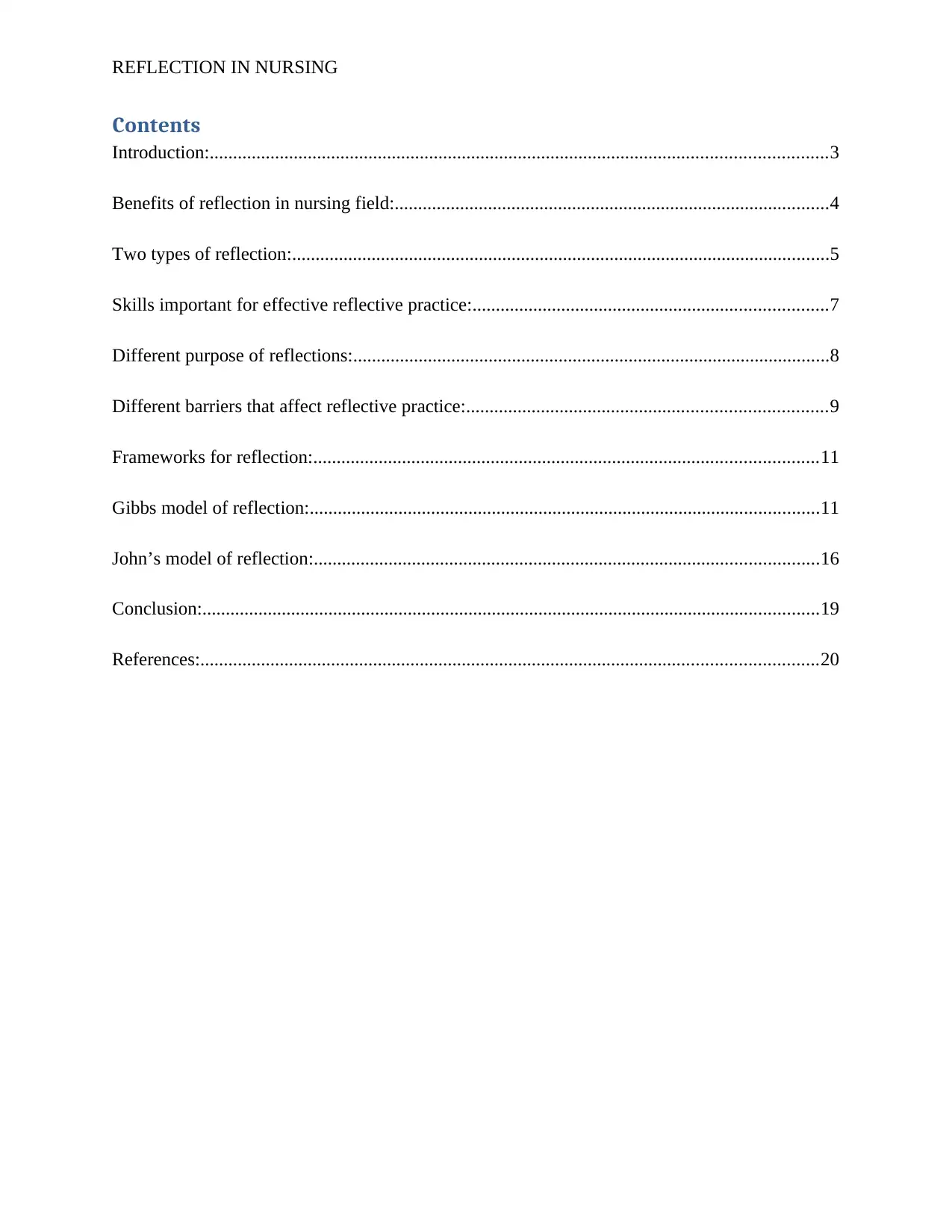
REFLECTION IN NURSING
Contents
Introduction:....................................................................................................................................3
Benefits of reflection in nursing field:.............................................................................................4
Two types of reflection:...................................................................................................................5
Skills important for effective reflective practice:............................................................................7
Different purpose of reflections:......................................................................................................8
Different barriers that affect reflective practice:.............................................................................9
Frameworks for reflection:............................................................................................................11
Gibbs model of reflection:.............................................................................................................11
John’s model of reflection:............................................................................................................16
Conclusion:....................................................................................................................................19
References:....................................................................................................................................20
Contents
Introduction:....................................................................................................................................3
Benefits of reflection in nursing field:.............................................................................................4
Two types of reflection:...................................................................................................................5
Skills important for effective reflective practice:............................................................................7
Different purpose of reflections:......................................................................................................8
Different barriers that affect reflective practice:.............................................................................9
Frameworks for reflection:............................................................................................................11
Gibbs model of reflection:.............................................................................................................11
John’s model of reflection:............................................................................................................16
Conclusion:....................................................................................................................................19
References:....................................................................................................................................20
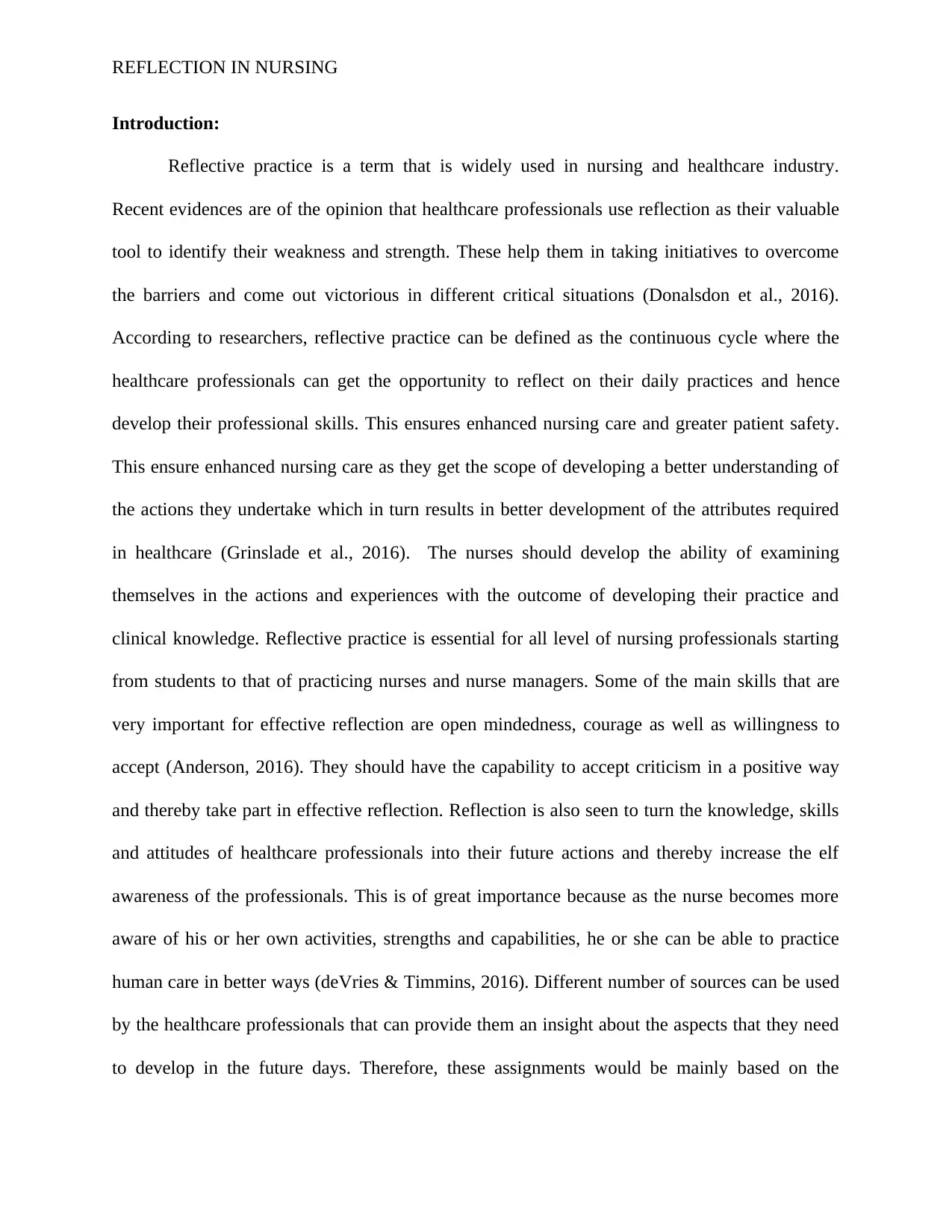
REFLECTION IN NURSING
Introduction:
Reflective practice is a term that is widely used in nursing and healthcare industry.
Recent evidences are of the opinion that healthcare professionals use reflection as their valuable
tool to identify their weakness and strength. These help them in taking initiatives to overcome
the barriers and come out victorious in different critical situations (Donalsdon et al., 2016).
According to researchers, reflective practice can be defined as the continuous cycle where the
healthcare professionals can get the opportunity to reflect on their daily practices and hence
develop their professional skills. This ensures enhanced nursing care and greater patient safety.
This ensure enhanced nursing care as they get the scope of developing a better understanding of
the actions they undertake which in turn results in better development of the attributes required
in healthcare (Grinslade et al., 2016). The nurses should develop the ability of examining
themselves in the actions and experiences with the outcome of developing their practice and
clinical knowledge. Reflective practice is essential for all level of nursing professionals starting
from students to that of practicing nurses and nurse managers. Some of the main skills that are
very important for effective reflection are open mindedness, courage as well as willingness to
accept (Anderson, 2016). They should have the capability to accept criticism in a positive way
and thereby take part in effective reflection. Reflection is also seen to turn the knowledge, skills
and attitudes of healthcare professionals into their future actions and thereby increase the elf
awareness of the professionals. This is of great importance because as the nurse becomes more
aware of his or her own activities, strengths and capabilities, he or she can be able to practice
human care in better ways (deVries & Timmins, 2016). Different number of sources can be used
by the healthcare professionals that can provide them an insight about the aspects that they need
to develop in the future days. Therefore, these assignments would be mainly based on the
Introduction:
Reflective practice is a term that is widely used in nursing and healthcare industry.
Recent evidences are of the opinion that healthcare professionals use reflection as their valuable
tool to identify their weakness and strength. These help them in taking initiatives to overcome
the barriers and come out victorious in different critical situations (Donalsdon et al., 2016).
According to researchers, reflective practice can be defined as the continuous cycle where the
healthcare professionals can get the opportunity to reflect on their daily practices and hence
develop their professional skills. This ensures enhanced nursing care and greater patient safety.
This ensure enhanced nursing care as they get the scope of developing a better understanding of
the actions they undertake which in turn results in better development of the attributes required
in healthcare (Grinslade et al., 2016). The nurses should develop the ability of examining
themselves in the actions and experiences with the outcome of developing their practice and
clinical knowledge. Reflective practice is essential for all level of nursing professionals starting
from students to that of practicing nurses and nurse managers. Some of the main skills that are
very important for effective reflection are open mindedness, courage as well as willingness to
accept (Anderson, 2016). They should have the capability to accept criticism in a positive way
and thereby take part in effective reflection. Reflection is also seen to turn the knowledge, skills
and attitudes of healthcare professionals into their future actions and thereby increase the elf
awareness of the professionals. This is of great importance because as the nurse becomes more
aware of his or her own activities, strengths and capabilities, he or she can be able to practice
human care in better ways (deVries & Timmins, 2016). Different number of sources can be used
by the healthcare professionals that can provide them an insight about the aspects that they need
to develop in the future days. Therefore, these assignments would be mainly based on the
⊘ This is a preview!⊘
Do you want full access?
Subscribe today to unlock all pages.

Trusted by 1+ million students worldwide
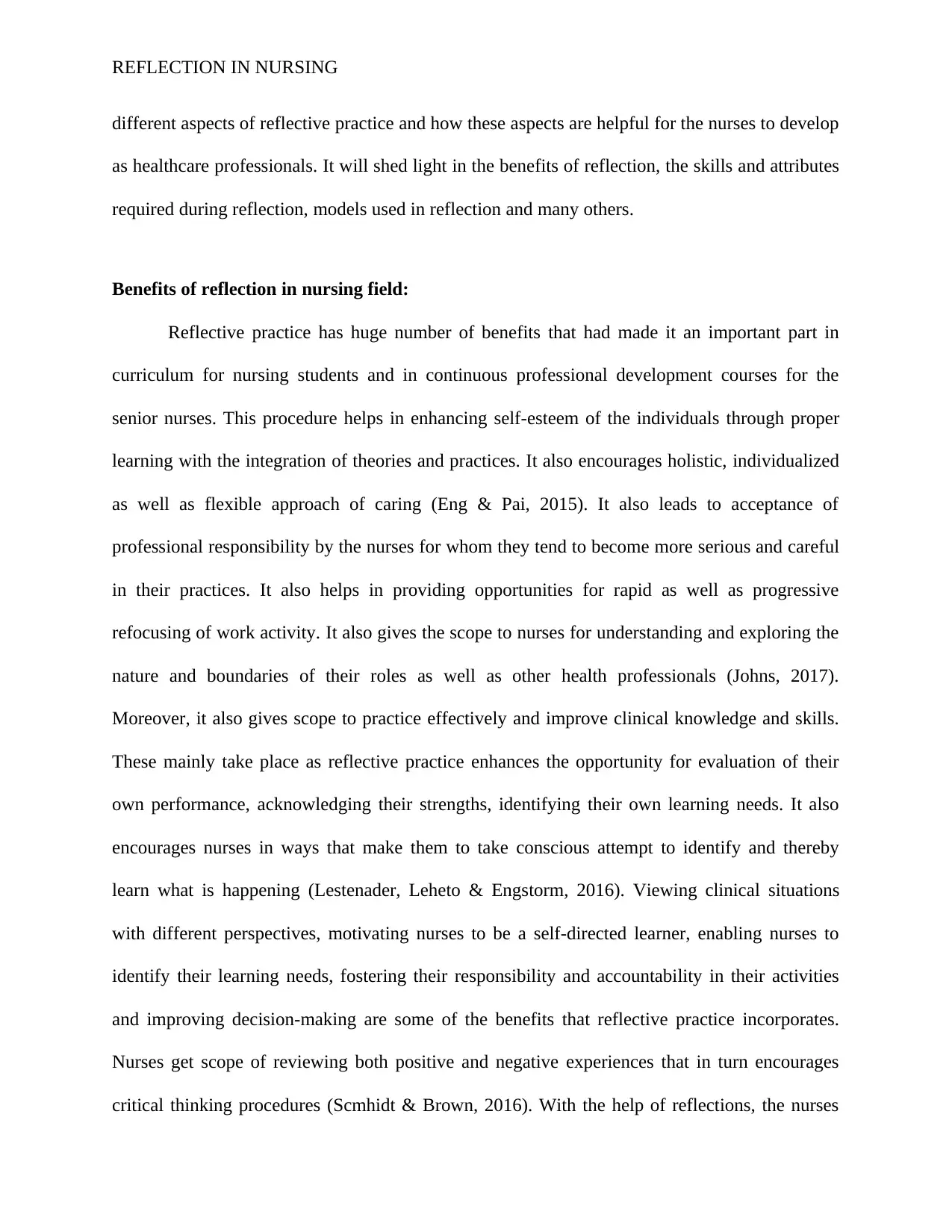
REFLECTION IN NURSING
different aspects of reflective practice and how these aspects are helpful for the nurses to develop
as healthcare professionals. It will shed light in the benefits of reflection, the skills and attributes
required during reflection, models used in reflection and many others.
Benefits of reflection in nursing field:
Reflective practice has huge number of benefits that had made it an important part in
curriculum for nursing students and in continuous professional development courses for the
senior nurses. This procedure helps in enhancing self-esteem of the individuals through proper
learning with the integration of theories and practices. It also encourages holistic, individualized
as well as flexible approach of caring (Eng & Pai, 2015). It also leads to acceptance of
professional responsibility by the nurses for whom they tend to become more serious and careful
in their practices. It also helps in providing opportunities for rapid as well as progressive
refocusing of work activity. It also gives the scope to nurses for understanding and exploring the
nature and boundaries of their roles as well as other health professionals (Johns, 2017).
Moreover, it also gives scope to practice effectively and improve clinical knowledge and skills.
These mainly take place as reflective practice enhances the opportunity for evaluation of their
own performance, acknowledging their strengths, identifying their own learning needs. It also
encourages nurses in ways that make them to take conscious attempt to identify and thereby
learn what is happening (Lestenader, Leheto & Engstorm, 2016). Viewing clinical situations
with different perspectives, motivating nurses to be a self-directed learner, enabling nurses to
identify their learning needs, fostering their responsibility and accountability in their activities
and improving decision-making are some of the benefits that reflective practice incorporates.
Nurses get scope of reviewing both positive and negative experiences that in turn encourages
critical thinking procedures (Scmhidt & Brown, 2016). With the help of reflections, the nurses
different aspects of reflective practice and how these aspects are helpful for the nurses to develop
as healthcare professionals. It will shed light in the benefits of reflection, the skills and attributes
required during reflection, models used in reflection and many others.
Benefits of reflection in nursing field:
Reflective practice has huge number of benefits that had made it an important part in
curriculum for nursing students and in continuous professional development courses for the
senior nurses. This procedure helps in enhancing self-esteem of the individuals through proper
learning with the integration of theories and practices. It also encourages holistic, individualized
as well as flexible approach of caring (Eng & Pai, 2015). It also leads to acceptance of
professional responsibility by the nurses for whom they tend to become more serious and careful
in their practices. It also helps in providing opportunities for rapid as well as progressive
refocusing of work activity. It also gives the scope to nurses for understanding and exploring the
nature and boundaries of their roles as well as other health professionals (Johns, 2017).
Moreover, it also gives scope to practice effectively and improve clinical knowledge and skills.
These mainly take place as reflective practice enhances the opportunity for evaluation of their
own performance, acknowledging their strengths, identifying their own learning needs. It also
encourages nurses in ways that make them to take conscious attempt to identify and thereby
learn what is happening (Lestenader, Leheto & Engstorm, 2016). Viewing clinical situations
with different perspectives, motivating nurses to be a self-directed learner, enabling nurses to
identify their learning needs, fostering their responsibility and accountability in their activities
and improving decision-making are some of the benefits that reflective practice incorporates.
Nurses get scope of reviewing both positive and negative experiences that in turn encourages
critical thinking procedures (Scmhidt & Brown, 2016). With the help of reflections, the nurses
Paraphrase This Document
Need a fresh take? Get an instant paraphrase of this document with our AI Paraphraser
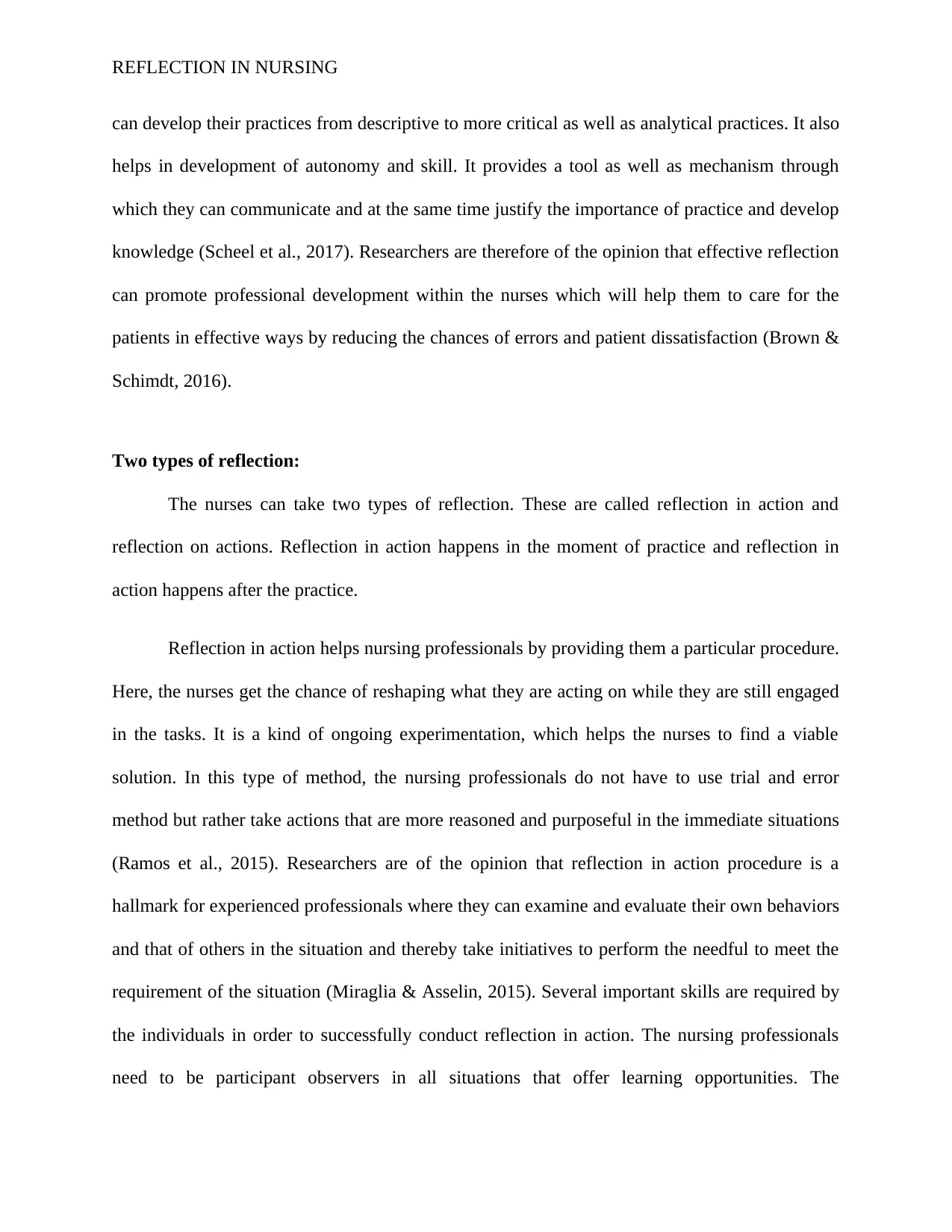
REFLECTION IN NURSING
can develop their practices from descriptive to more critical as well as analytical practices. It also
helps in development of autonomy and skill. It provides a tool as well as mechanism through
which they can communicate and at the same time justify the importance of practice and develop
knowledge (Scheel et al., 2017). Researchers are therefore of the opinion that effective reflection
can promote professional development within the nurses which will help them to care for the
patients in effective ways by reducing the chances of errors and patient dissatisfaction (Brown &
Schimdt, 2016).
Two types of reflection:
The nurses can take two types of reflection. These are called reflection in action and
reflection on actions. Reflection in action happens in the moment of practice and reflection in
action happens after the practice.
Reflection in action helps nursing professionals by providing them a particular procedure.
Here, the nurses get the chance of reshaping what they are acting on while they are still engaged
in the tasks. It is a kind of ongoing experimentation, which helps the nurses to find a viable
solution. In this type of method, the nursing professionals do not have to use trial and error
method but rather take actions that are more reasoned and purposeful in the immediate situations
(Ramos et al., 2015). Researchers are of the opinion that reflection in action procedure is a
hallmark for experienced professionals where they can examine and evaluate their own behaviors
and that of others in the situation and thereby take initiatives to perform the needful to meet the
requirement of the situation (Miraglia & Asselin, 2015). Several important skills are required by
the individuals in order to successfully conduct reflection in action. The nursing professionals
need to be participant observers in all situations that offer learning opportunities. The
can develop their practices from descriptive to more critical as well as analytical practices. It also
helps in development of autonomy and skill. It provides a tool as well as mechanism through
which they can communicate and at the same time justify the importance of practice and develop
knowledge (Scheel et al., 2017). Researchers are therefore of the opinion that effective reflection
can promote professional development within the nurses which will help them to care for the
patients in effective ways by reducing the chances of errors and patient dissatisfaction (Brown &
Schimdt, 2016).
Two types of reflection:
The nurses can take two types of reflection. These are called reflection in action and
reflection on actions. Reflection in action happens in the moment of practice and reflection in
action happens after the practice.
Reflection in action helps nursing professionals by providing them a particular procedure.
Here, the nurses get the chance of reshaping what they are acting on while they are still engaged
in the tasks. It is a kind of ongoing experimentation, which helps the nurses to find a viable
solution. In this type of method, the nursing professionals do not have to use trial and error
method but rather take actions that are more reasoned and purposeful in the immediate situations
(Ramos et al., 2015). Researchers are of the opinion that reflection in action procedure is a
hallmark for experienced professionals where they can examine and evaluate their own behaviors
and that of others in the situation and thereby take initiatives to perform the needful to meet the
requirement of the situation (Miraglia & Asselin, 2015). Several important skills are required by
the individuals in order to successfully conduct reflection in action. The nursing professionals
need to be participant observers in all situations that offer learning opportunities. The
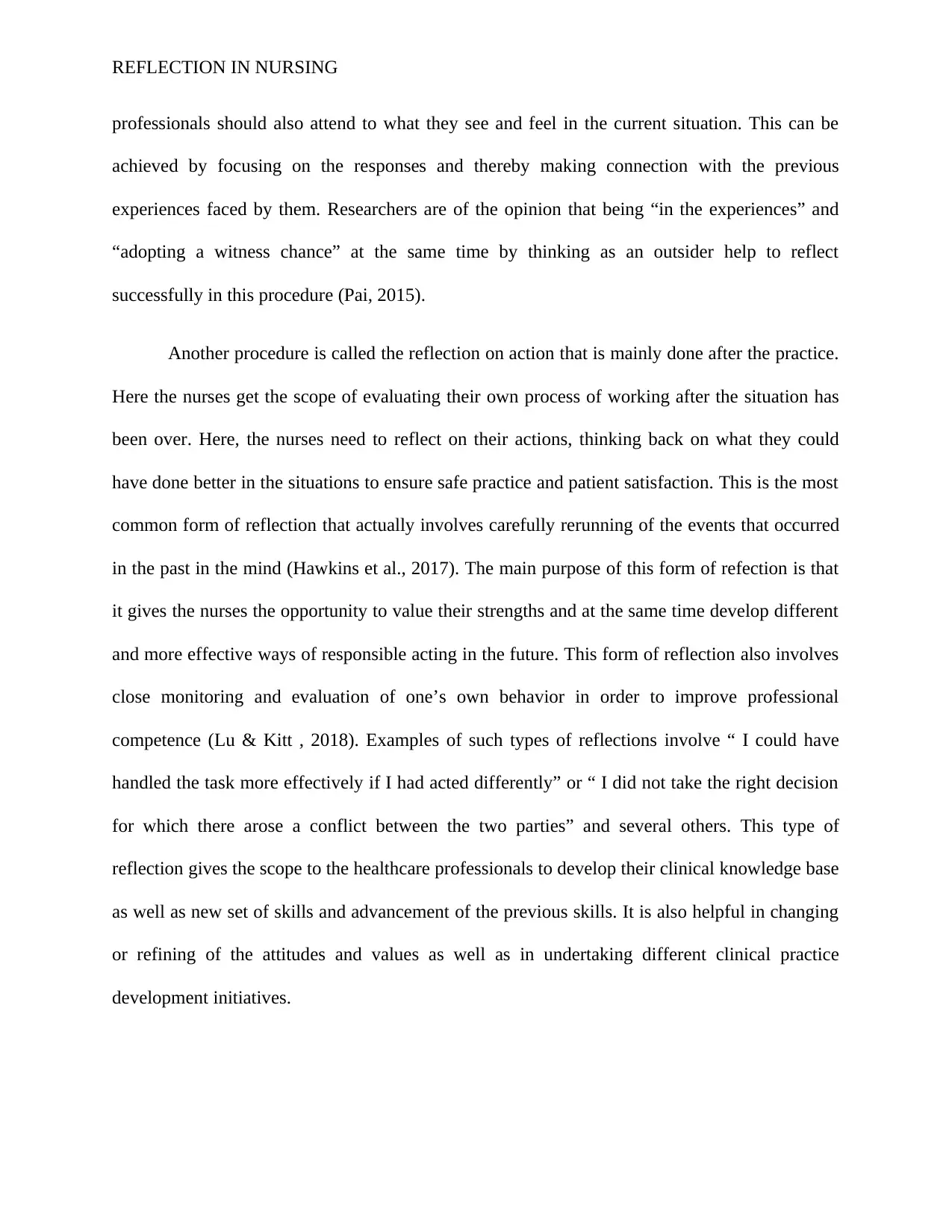
REFLECTION IN NURSING
professionals should also attend to what they see and feel in the current situation. This can be
achieved by focusing on the responses and thereby making connection with the previous
experiences faced by them. Researchers are of the opinion that being “in the experiences” and
“adopting a witness chance” at the same time by thinking as an outsider help to reflect
successfully in this procedure (Pai, 2015).
Another procedure is called the reflection on action that is mainly done after the practice.
Here the nurses get the scope of evaluating their own process of working after the situation has
been over. Here, the nurses need to reflect on their actions, thinking back on what they could
have done better in the situations to ensure safe practice and patient satisfaction. This is the most
common form of reflection that actually involves carefully rerunning of the events that occurred
in the past in the mind (Hawkins et al., 2017). The main purpose of this form of refection is that
it gives the nurses the opportunity to value their strengths and at the same time develop different
and more effective ways of responsible acting in the future. This form of reflection also involves
close monitoring and evaluation of one’s own behavior in order to improve professional
competence (Lu & Kitt , 2018). Examples of such types of reflections involve “ I could have
handled the task more effectively if I had acted differently” or “ I did not take the right decision
for which there arose a conflict between the two parties” and several others. This type of
reflection gives the scope to the healthcare professionals to develop their clinical knowledge base
as well as new set of skills and advancement of the previous skills. It is also helpful in changing
or refining of the attitudes and values as well as in undertaking different clinical practice
development initiatives.
professionals should also attend to what they see and feel in the current situation. This can be
achieved by focusing on the responses and thereby making connection with the previous
experiences faced by them. Researchers are of the opinion that being “in the experiences” and
“adopting a witness chance” at the same time by thinking as an outsider help to reflect
successfully in this procedure (Pai, 2015).
Another procedure is called the reflection on action that is mainly done after the practice.
Here the nurses get the scope of evaluating their own process of working after the situation has
been over. Here, the nurses need to reflect on their actions, thinking back on what they could
have done better in the situations to ensure safe practice and patient satisfaction. This is the most
common form of reflection that actually involves carefully rerunning of the events that occurred
in the past in the mind (Hawkins et al., 2017). The main purpose of this form of refection is that
it gives the nurses the opportunity to value their strengths and at the same time develop different
and more effective ways of responsible acting in the future. This form of reflection also involves
close monitoring and evaluation of one’s own behavior in order to improve professional
competence (Lu & Kitt , 2018). Examples of such types of reflections involve “ I could have
handled the task more effectively if I had acted differently” or “ I did not take the right decision
for which there arose a conflict between the two parties” and several others. This type of
reflection gives the scope to the healthcare professionals to develop their clinical knowledge base
as well as new set of skills and advancement of the previous skills. It is also helpful in changing
or refining of the attitudes and values as well as in undertaking different clinical practice
development initiatives.
⊘ This is a preview!⊘
Do you want full access?
Subscribe today to unlock all pages.

Trusted by 1+ million students worldwide
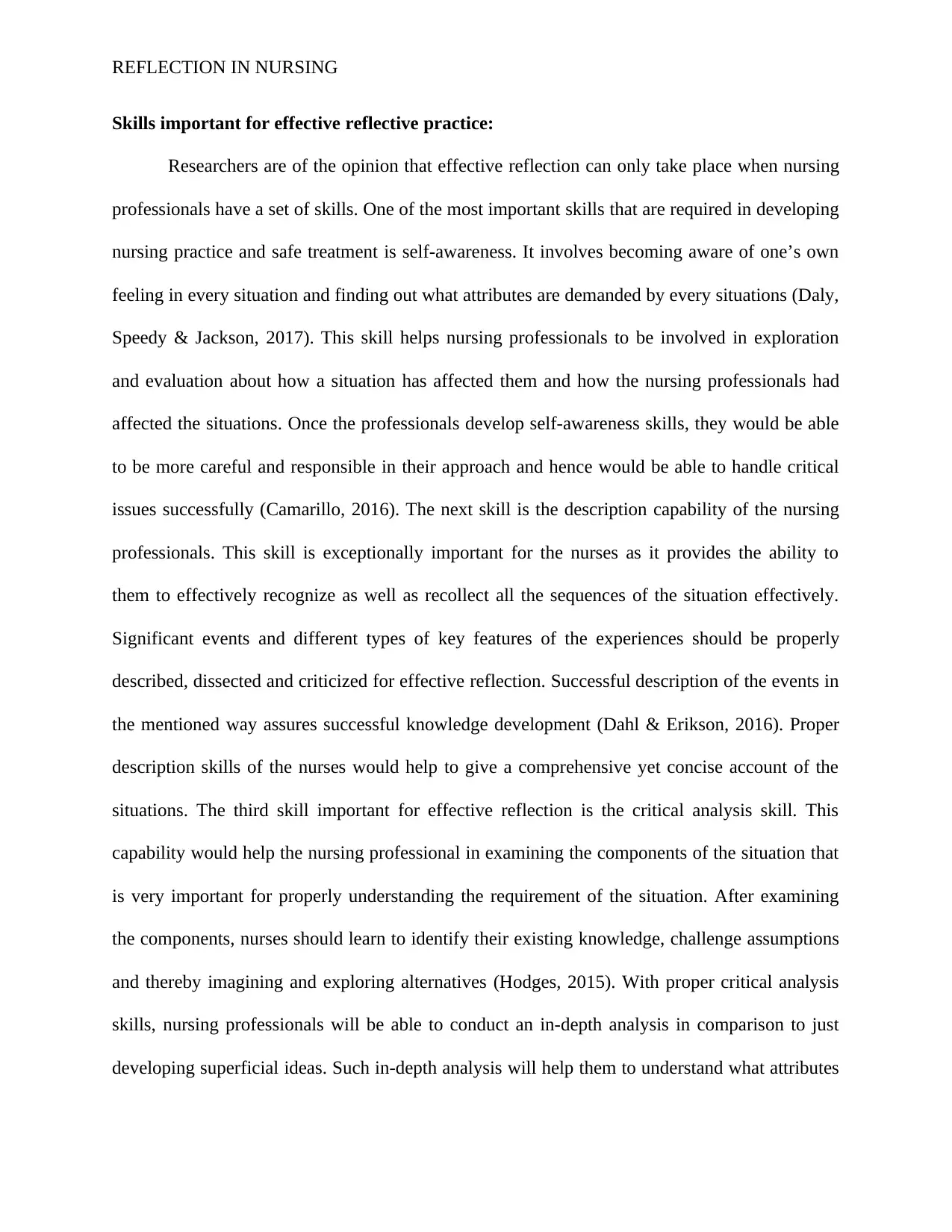
REFLECTION IN NURSING
Skills important for effective reflective practice:
Researchers are of the opinion that effective reflection can only take place when nursing
professionals have a set of skills. One of the most important skills that are required in developing
nursing practice and safe treatment is self-awareness. It involves becoming aware of one’s own
feeling in every situation and finding out what attributes are demanded by every situations (Daly,
Speedy & Jackson, 2017). This skill helps nursing professionals to be involved in exploration
and evaluation about how a situation has affected them and how the nursing professionals had
affected the situations. Once the professionals develop self-awareness skills, they would be able
to be more careful and responsible in their approach and hence would be able to handle critical
issues successfully (Camarillo, 2016). The next skill is the description capability of the nursing
professionals. This skill is exceptionally important for the nurses as it provides the ability to
them to effectively recognize as well as recollect all the sequences of the situation effectively.
Significant events and different types of key features of the experiences should be properly
described, dissected and criticized for effective reflection. Successful description of the events in
the mentioned way assures successful knowledge development (Dahl & Erikson, 2016). Proper
description skills of the nurses would help to give a comprehensive yet concise account of the
situations. The third skill important for effective reflection is the critical analysis skill. This
capability would help the nursing professional in examining the components of the situation that
is very important for properly understanding the requirement of the situation. After examining
the components, nurses should learn to identify their existing knowledge, challenge assumptions
and thereby imagining and exploring alternatives (Hodges, 2015). With proper critical analysis
skills, nursing professionals will be able to conduct an in-depth analysis in comparison to just
developing superficial ideas. Such in-depth analysis will help them to understand what attributes
Skills important for effective reflective practice:
Researchers are of the opinion that effective reflection can only take place when nursing
professionals have a set of skills. One of the most important skills that are required in developing
nursing practice and safe treatment is self-awareness. It involves becoming aware of one’s own
feeling in every situation and finding out what attributes are demanded by every situations (Daly,
Speedy & Jackson, 2017). This skill helps nursing professionals to be involved in exploration
and evaluation about how a situation has affected them and how the nursing professionals had
affected the situations. Once the professionals develop self-awareness skills, they would be able
to be more careful and responsible in their approach and hence would be able to handle critical
issues successfully (Camarillo, 2016). The next skill is the description capability of the nursing
professionals. This skill is exceptionally important for the nurses as it provides the ability to
them to effectively recognize as well as recollect all the sequences of the situation effectively.
Significant events and different types of key features of the experiences should be properly
described, dissected and criticized for effective reflection. Successful description of the events in
the mentioned way assures successful knowledge development (Dahl & Erikson, 2016). Proper
description skills of the nurses would help to give a comprehensive yet concise account of the
situations. The third skill important for effective reflection is the critical analysis skill. This
capability would help the nursing professional in examining the components of the situation that
is very important for properly understanding the requirement of the situation. After examining
the components, nurses should learn to identify their existing knowledge, challenge assumptions
and thereby imagining and exploring alternatives (Hodges, 2015). With proper critical analysis
skills, nursing professionals will be able to conduct an in-depth analysis in comparison to just
developing superficial ideas. Such in-depth analysis will help them to understand what attributes
Paraphrase This Document
Need a fresh take? Get an instant paraphrase of this document with our AI Paraphraser
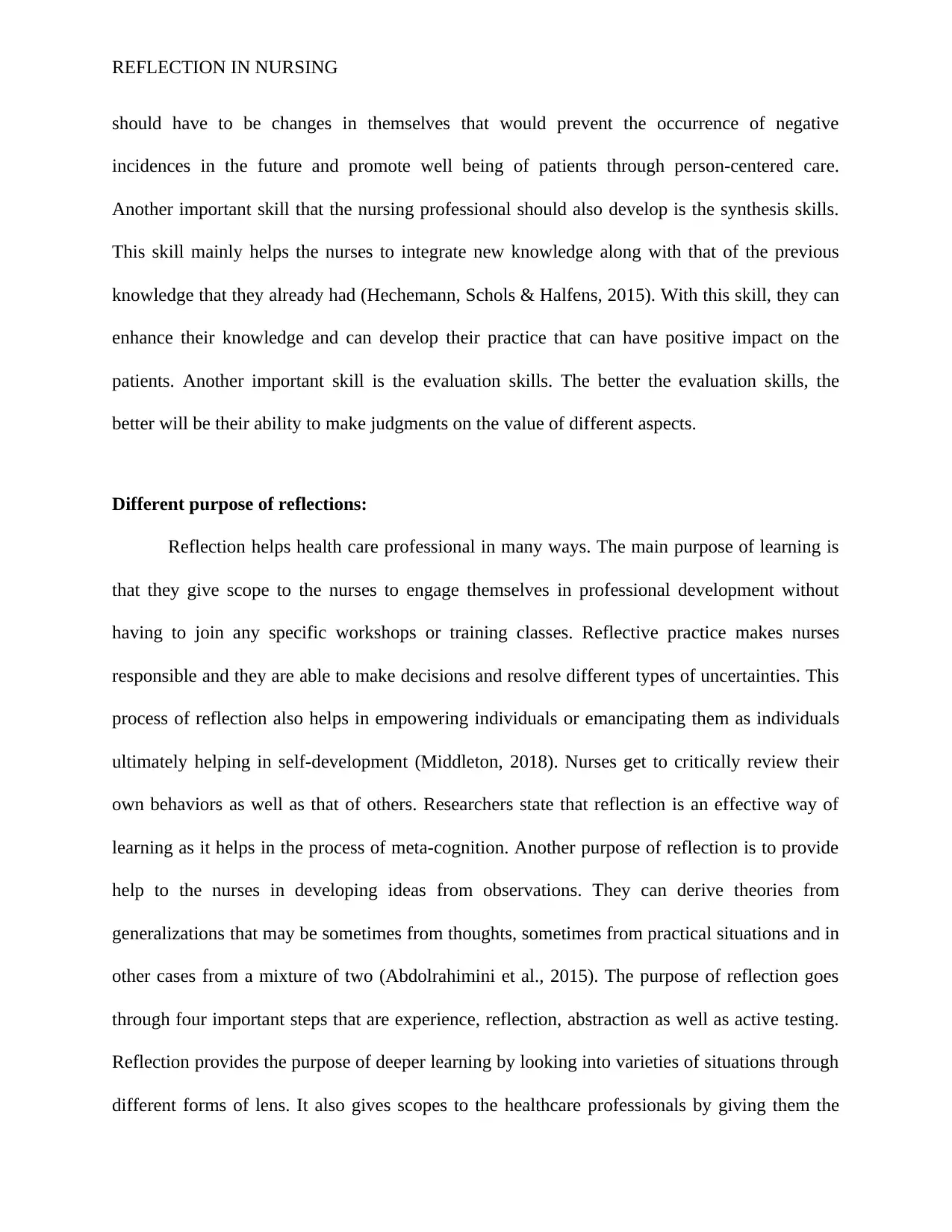
REFLECTION IN NURSING
should have to be changes in themselves that would prevent the occurrence of negative
incidences in the future and promote well being of patients through person-centered care.
Another important skill that the nursing professional should also develop is the synthesis skills.
This skill mainly helps the nurses to integrate new knowledge along with that of the previous
knowledge that they already had (Hechemann, Schols & Halfens, 2015). With this skill, they can
enhance their knowledge and can develop their practice that can have positive impact on the
patients. Another important skill is the evaluation skills. The better the evaluation skills, the
better will be their ability to make judgments on the value of different aspects.
Different purpose of reflections:
Reflection helps health care professional in many ways. The main purpose of learning is
that they give scope to the nurses to engage themselves in professional development without
having to join any specific workshops or training classes. Reflective practice makes nurses
responsible and they are able to make decisions and resolve different types of uncertainties. This
process of reflection also helps in empowering individuals or emancipating them as individuals
ultimately helping in self-development (Middleton, 2018). Nurses get to critically review their
own behaviors as well as that of others. Researchers state that reflection is an effective way of
learning as it helps in the process of meta-cognition. Another purpose of reflection is to provide
help to the nurses in developing ideas from observations. They can derive theories from
generalizations that may be sometimes from thoughts, sometimes from practical situations and in
other cases from a mixture of two (Abdolrahimini et al., 2015). The purpose of reflection goes
through four important steps that are experience, reflection, abstraction as well as active testing.
Reflection provides the purpose of deeper learning by looking into varieties of situations through
different forms of lens. It also gives scopes to the healthcare professionals by giving them the
should have to be changes in themselves that would prevent the occurrence of negative
incidences in the future and promote well being of patients through person-centered care.
Another important skill that the nursing professional should also develop is the synthesis skills.
This skill mainly helps the nurses to integrate new knowledge along with that of the previous
knowledge that they already had (Hechemann, Schols & Halfens, 2015). With this skill, they can
enhance their knowledge and can develop their practice that can have positive impact on the
patients. Another important skill is the evaluation skills. The better the evaluation skills, the
better will be their ability to make judgments on the value of different aspects.
Different purpose of reflections:
Reflection helps health care professional in many ways. The main purpose of learning is
that they give scope to the nurses to engage themselves in professional development without
having to join any specific workshops or training classes. Reflective practice makes nurses
responsible and they are able to make decisions and resolve different types of uncertainties. This
process of reflection also helps in empowering individuals or emancipating them as individuals
ultimately helping in self-development (Middleton, 2018). Nurses get to critically review their
own behaviors as well as that of others. Researchers state that reflection is an effective way of
learning as it helps in the process of meta-cognition. Another purpose of reflection is to provide
help to the nurses in developing ideas from observations. They can derive theories from
generalizations that may be sometimes from thoughts, sometimes from practical situations and in
other cases from a mixture of two (Abdolrahimini et al., 2015). The purpose of reflection goes
through four important steps that are experience, reflection, abstraction as well as active testing.
Reflection provides the purpose of deeper learning by looking into varieties of situations through
different forms of lens. It also gives scopes to the healthcare professionals by giving them the
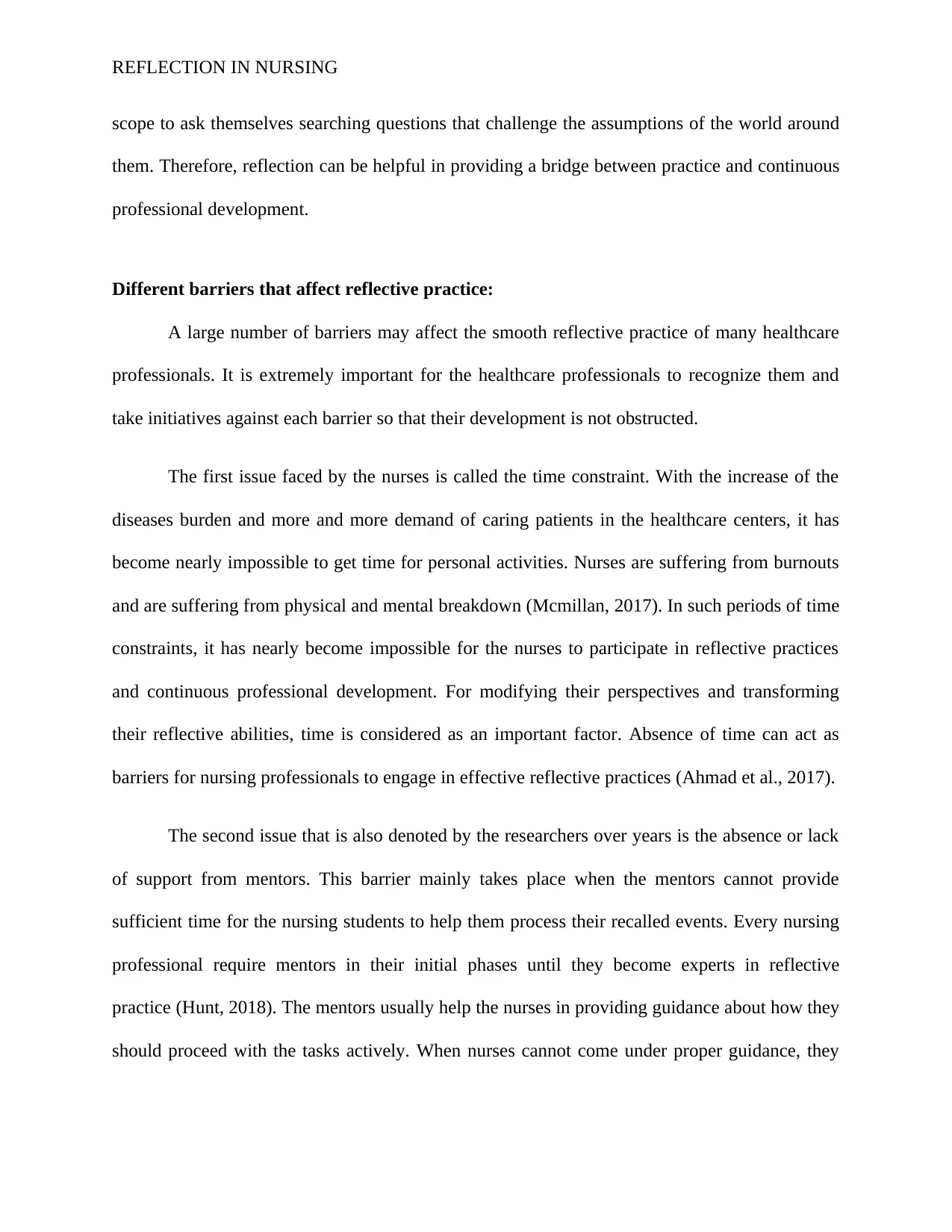
REFLECTION IN NURSING
scope to ask themselves searching questions that challenge the assumptions of the world around
them. Therefore, reflection can be helpful in providing a bridge between practice and continuous
professional development.
Different barriers that affect reflective practice:
A large number of barriers may affect the smooth reflective practice of many healthcare
professionals. It is extremely important for the healthcare professionals to recognize them and
take initiatives against each barrier so that their development is not obstructed.
The first issue faced by the nurses is called the time constraint. With the increase of the
diseases burden and more and more demand of caring patients in the healthcare centers, it has
become nearly impossible to get time for personal activities. Nurses are suffering from burnouts
and are suffering from physical and mental breakdown (Mcmillan, 2017). In such periods of time
constraints, it has nearly become impossible for the nurses to participate in reflective practices
and continuous professional development. For modifying their perspectives and transforming
their reflective abilities, time is considered as an important factor. Absence of time can act as
barriers for nursing professionals to engage in effective reflective practices (Ahmad et al., 2017).
The second issue that is also denoted by the researchers over years is the absence or lack
of support from mentors. This barrier mainly takes place when the mentors cannot provide
sufficient time for the nursing students to help them process their recalled events. Every nursing
professional require mentors in their initial phases until they become experts in reflective
practice (Hunt, 2018). The mentors usually help the nurses in providing guidance about how they
should proceed with the tasks actively. When nurses cannot come under proper guidance, they
scope to ask themselves searching questions that challenge the assumptions of the world around
them. Therefore, reflection can be helpful in providing a bridge between practice and continuous
professional development.
Different barriers that affect reflective practice:
A large number of barriers may affect the smooth reflective practice of many healthcare
professionals. It is extremely important for the healthcare professionals to recognize them and
take initiatives against each barrier so that their development is not obstructed.
The first issue faced by the nurses is called the time constraint. With the increase of the
diseases burden and more and more demand of caring patients in the healthcare centers, it has
become nearly impossible to get time for personal activities. Nurses are suffering from burnouts
and are suffering from physical and mental breakdown (Mcmillan, 2017). In such periods of time
constraints, it has nearly become impossible for the nurses to participate in reflective practices
and continuous professional development. For modifying their perspectives and transforming
their reflective abilities, time is considered as an important factor. Absence of time can act as
barriers for nursing professionals to engage in effective reflective practices (Ahmad et al., 2017).
The second issue that is also denoted by the researchers over years is the absence or lack
of support from mentors. This barrier mainly takes place when the mentors cannot provide
sufficient time for the nursing students to help them process their recalled events. Every nursing
professional require mentors in their initial phases until they become experts in reflective
practice (Hunt, 2018). The mentors usually help the nurses in providing guidance about how they
should proceed with the tasks actively. When nurses cannot come under proper guidance, they
⊘ This is a preview!⊘
Do you want full access?
Subscribe today to unlock all pages.

Trusted by 1+ million students worldwide
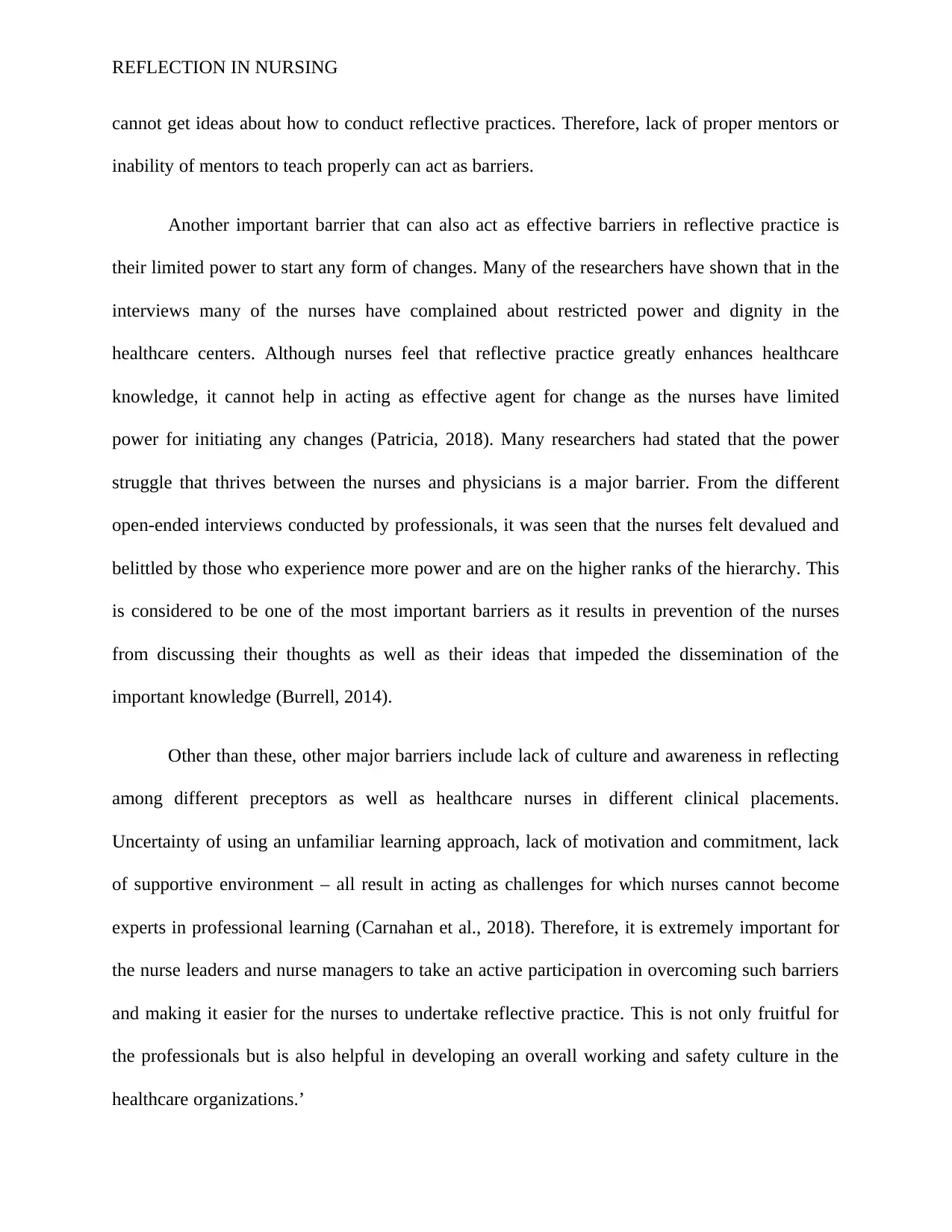
REFLECTION IN NURSING
cannot get ideas about how to conduct reflective practices. Therefore, lack of proper mentors or
inability of mentors to teach properly can act as barriers.
Another important barrier that can also act as effective barriers in reflective practice is
their limited power to start any form of changes. Many of the researchers have shown that in the
interviews many of the nurses have complained about restricted power and dignity in the
healthcare centers. Although nurses feel that reflective practice greatly enhances healthcare
knowledge, it cannot help in acting as effective agent for change as the nurses have limited
power for initiating any changes (Patricia, 2018). Many researchers had stated that the power
struggle that thrives between the nurses and physicians is a major barrier. From the different
open-ended interviews conducted by professionals, it was seen that the nurses felt devalued and
belittled by those who experience more power and are on the higher ranks of the hierarchy. This
is considered to be one of the most important barriers as it results in prevention of the nurses
from discussing their thoughts as well as their ideas that impeded the dissemination of the
important knowledge (Burrell, 2014).
Other than these, other major barriers include lack of culture and awareness in reflecting
among different preceptors as well as healthcare nurses in different clinical placements.
Uncertainty of using an unfamiliar learning approach, lack of motivation and commitment, lack
of supportive environment – all result in acting as challenges for which nurses cannot become
experts in professional learning (Carnahan et al., 2018). Therefore, it is extremely important for
the nurse leaders and nurse managers to take an active participation in overcoming such barriers
and making it easier for the nurses to undertake reflective practice. This is not only fruitful for
the professionals but is also helpful in developing an overall working and safety culture in the
healthcare organizations.’
cannot get ideas about how to conduct reflective practices. Therefore, lack of proper mentors or
inability of mentors to teach properly can act as barriers.
Another important barrier that can also act as effective barriers in reflective practice is
their limited power to start any form of changes. Many of the researchers have shown that in the
interviews many of the nurses have complained about restricted power and dignity in the
healthcare centers. Although nurses feel that reflective practice greatly enhances healthcare
knowledge, it cannot help in acting as effective agent for change as the nurses have limited
power for initiating any changes (Patricia, 2018). Many researchers had stated that the power
struggle that thrives between the nurses and physicians is a major barrier. From the different
open-ended interviews conducted by professionals, it was seen that the nurses felt devalued and
belittled by those who experience more power and are on the higher ranks of the hierarchy. This
is considered to be one of the most important barriers as it results in prevention of the nurses
from discussing their thoughts as well as their ideas that impeded the dissemination of the
important knowledge (Burrell, 2014).
Other than these, other major barriers include lack of culture and awareness in reflecting
among different preceptors as well as healthcare nurses in different clinical placements.
Uncertainty of using an unfamiliar learning approach, lack of motivation and commitment, lack
of supportive environment – all result in acting as challenges for which nurses cannot become
experts in professional learning (Carnahan et al., 2018). Therefore, it is extremely important for
the nurse leaders and nurse managers to take an active participation in overcoming such barriers
and making it easier for the nurses to undertake reflective practice. This is not only fruitful for
the professionals but is also helpful in developing an overall working and safety culture in the
healthcare organizations.’
Paraphrase This Document
Need a fresh take? Get an instant paraphrase of this document with our AI Paraphraser
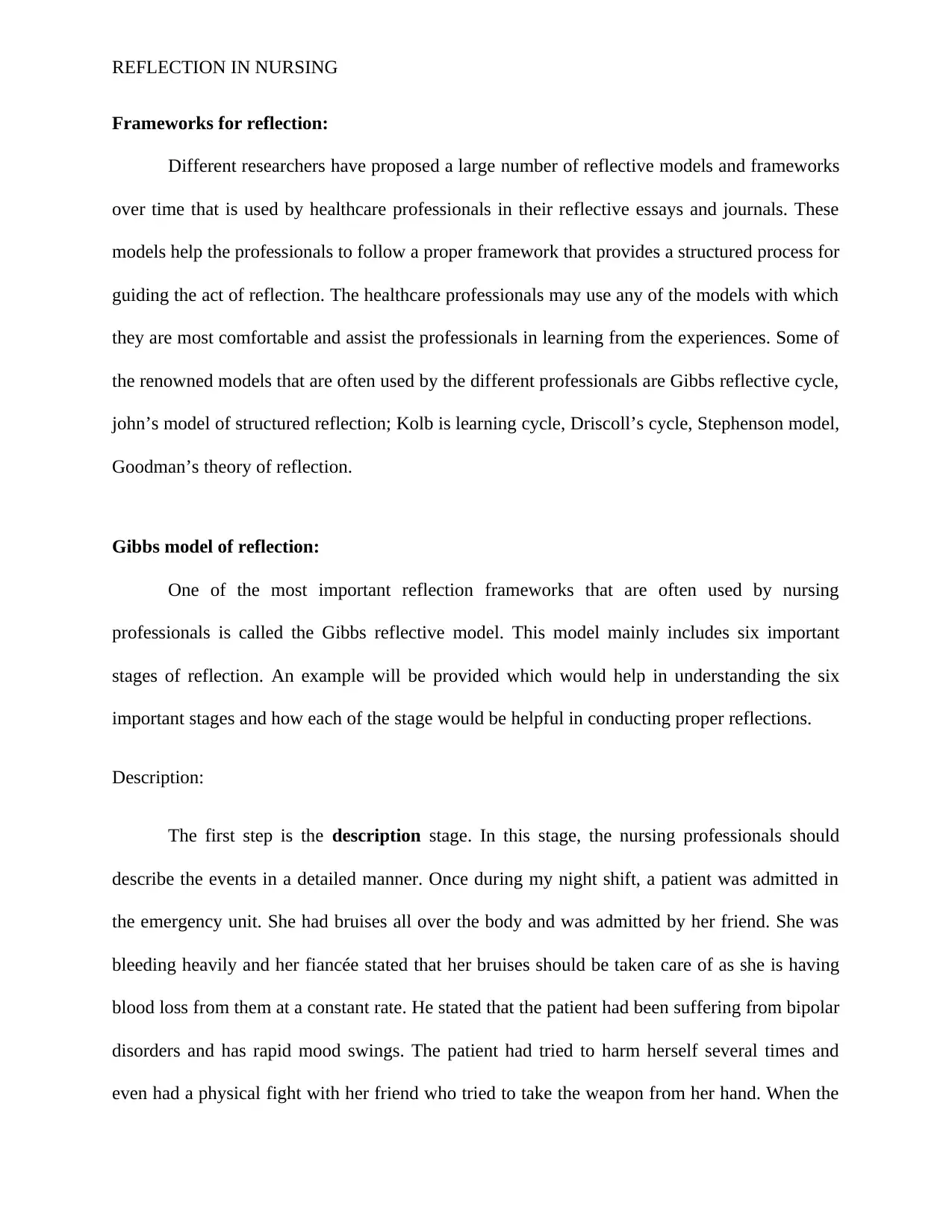
REFLECTION IN NURSING
Frameworks for reflection:
Different researchers have proposed a large number of reflective models and frameworks
over time that is used by healthcare professionals in their reflective essays and journals. These
models help the professionals to follow a proper framework that provides a structured process for
guiding the act of reflection. The healthcare professionals may use any of the models with which
they are most comfortable and assist the professionals in learning from the experiences. Some of
the renowned models that are often used by the different professionals are Gibbs reflective cycle,
john’s model of structured reflection; Kolb is learning cycle, Driscoll’s cycle, Stephenson model,
Goodman’s theory of reflection.
Gibbs model of reflection:
One of the most important reflection frameworks that are often used by nursing
professionals is called the Gibbs reflective model. This model mainly includes six important
stages of reflection. An example will be provided which would help in understanding the six
important stages and how each of the stage would be helpful in conducting proper reflections.
Description:
The first step is the description stage. In this stage, the nursing professionals should
describe the events in a detailed manner. Once during my night shift, a patient was admitted in
the emergency unit. She had bruises all over the body and was admitted by her friend. She was
bleeding heavily and her fiancée stated that her bruises should be taken care of as she is having
blood loss from them at a constant rate. He stated that the patient had been suffering from bipolar
disorders and has rapid mood swings. The patient had tried to harm herself several times and
even had a physical fight with her friend who tried to take the weapon from her hand. When the
Frameworks for reflection:
Different researchers have proposed a large number of reflective models and frameworks
over time that is used by healthcare professionals in their reflective essays and journals. These
models help the professionals to follow a proper framework that provides a structured process for
guiding the act of reflection. The healthcare professionals may use any of the models with which
they are most comfortable and assist the professionals in learning from the experiences. Some of
the renowned models that are often used by the different professionals are Gibbs reflective cycle,
john’s model of structured reflection; Kolb is learning cycle, Driscoll’s cycle, Stephenson model,
Goodman’s theory of reflection.
Gibbs model of reflection:
One of the most important reflection frameworks that are often used by nursing
professionals is called the Gibbs reflective model. This model mainly includes six important
stages of reflection. An example will be provided which would help in understanding the six
important stages and how each of the stage would be helpful in conducting proper reflections.
Description:
The first step is the description stage. In this stage, the nursing professionals should
describe the events in a detailed manner. Once during my night shift, a patient was admitted in
the emergency unit. She had bruises all over the body and was admitted by her friend. She was
bleeding heavily and her fiancée stated that her bruises should be taken care of as she is having
blood loss from them at a constant rate. He stated that the patient had been suffering from bipolar
disorders and has rapid mood swings. The patient had tried to harm herself several times and
even had a physical fight with her friend who tried to take the weapon from her hand. When the
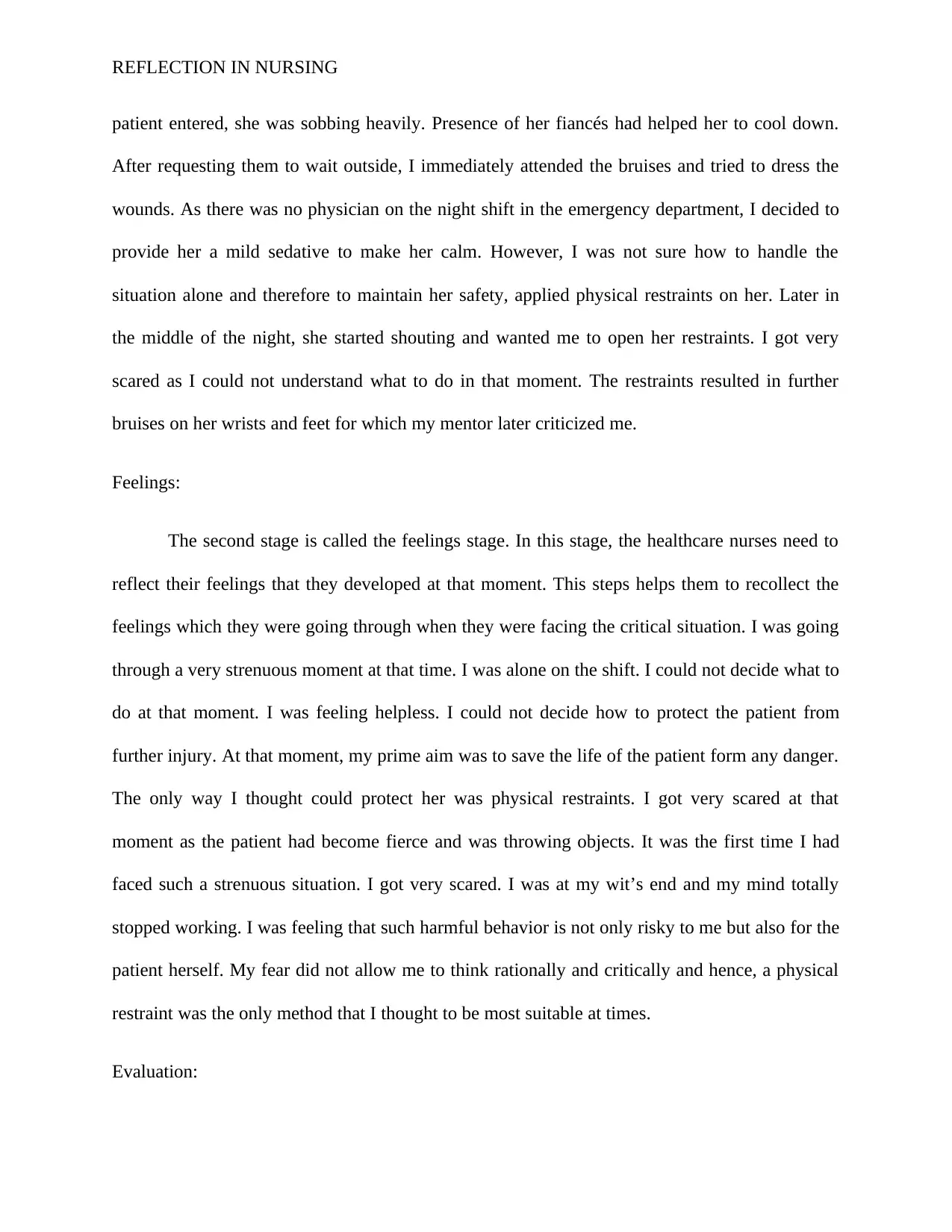
REFLECTION IN NURSING
patient entered, she was sobbing heavily. Presence of her fiancés had helped her to cool down.
After requesting them to wait outside, I immediately attended the bruises and tried to dress the
wounds. As there was no physician on the night shift in the emergency department, I decided to
provide her a mild sedative to make her calm. However, I was not sure how to handle the
situation alone and therefore to maintain her safety, applied physical restraints on her. Later in
the middle of the night, she started shouting and wanted me to open her restraints. I got very
scared as I could not understand what to do in that moment. The restraints resulted in further
bruises on her wrists and feet for which my mentor later criticized me.
Feelings:
The second stage is called the feelings stage. In this stage, the healthcare nurses need to
reflect their feelings that they developed at that moment. This steps helps them to recollect the
feelings which they were going through when they were facing the critical situation. I was going
through a very strenuous moment at that time. I was alone on the shift. I could not decide what to
do at that moment. I was feeling helpless. I could not decide how to protect the patient from
further injury. At that moment, my prime aim was to save the life of the patient form any danger.
The only way I thought could protect her was physical restraints. I got very scared at that
moment as the patient had become fierce and was throwing objects. It was the first time I had
faced such a strenuous situation. I got very scared. I was at my wit’s end and my mind totally
stopped working. I was feeling that such harmful behavior is not only risky to me but also for the
patient herself. My fear did not allow me to think rationally and critically and hence, a physical
restraint was the only method that I thought to be most suitable at times.
Evaluation:
patient entered, she was sobbing heavily. Presence of her fiancés had helped her to cool down.
After requesting them to wait outside, I immediately attended the bruises and tried to dress the
wounds. As there was no physician on the night shift in the emergency department, I decided to
provide her a mild sedative to make her calm. However, I was not sure how to handle the
situation alone and therefore to maintain her safety, applied physical restraints on her. Later in
the middle of the night, she started shouting and wanted me to open her restraints. I got very
scared as I could not understand what to do in that moment. The restraints resulted in further
bruises on her wrists and feet for which my mentor later criticized me.
Feelings:
The second stage is called the feelings stage. In this stage, the healthcare nurses need to
reflect their feelings that they developed at that moment. This steps helps them to recollect the
feelings which they were going through when they were facing the critical situation. I was going
through a very strenuous moment at that time. I was alone on the shift. I could not decide what to
do at that moment. I was feeling helpless. I could not decide how to protect the patient from
further injury. At that moment, my prime aim was to save the life of the patient form any danger.
The only way I thought could protect her was physical restraints. I got very scared at that
moment as the patient had become fierce and was throwing objects. It was the first time I had
faced such a strenuous situation. I got very scared. I was at my wit’s end and my mind totally
stopped working. I was feeling that such harmful behavior is not only risky to me but also for the
patient herself. My fear did not allow me to think rationally and critically and hence, a physical
restraint was the only method that I thought to be most suitable at times.
Evaluation:
⊘ This is a preview!⊘
Do you want full access?
Subscribe today to unlock all pages.

Trusted by 1+ million students worldwide
1 out of 24
Related Documents
Your All-in-One AI-Powered Toolkit for Academic Success.
+13062052269
info@desklib.com
Available 24*7 on WhatsApp / Email
![[object Object]](/_next/static/media/star-bottom.7253800d.svg)
Unlock your academic potential
Copyright © 2020–2026 A2Z Services. All Rights Reserved. Developed and managed by ZUCOL.




